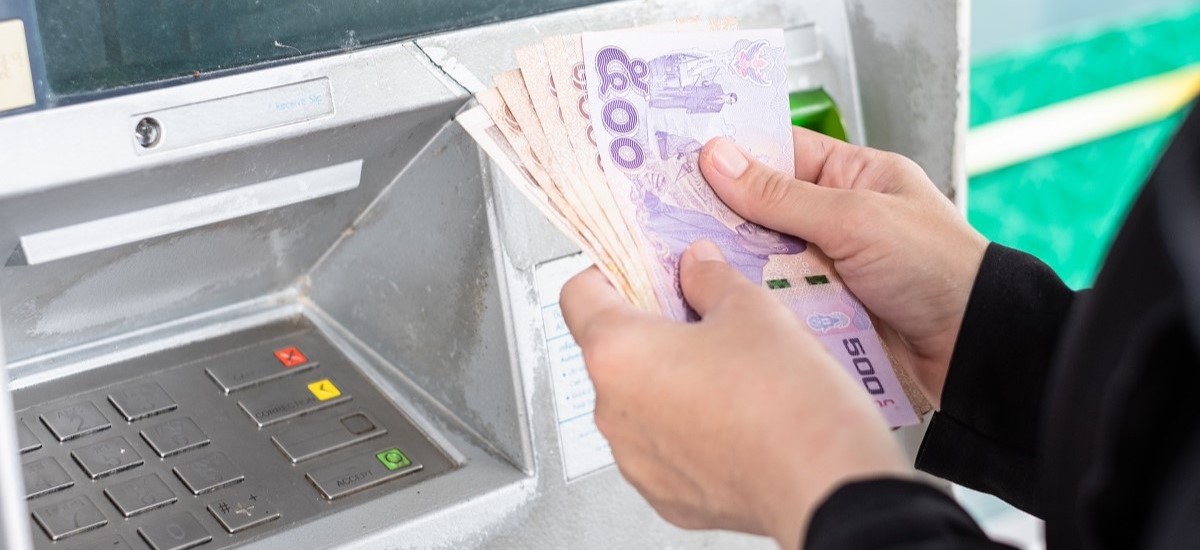Money in Thailand: Banks, ATMs, cards & currency exchange
Read our helpful guide to money, banks and currency in Thailand, plus info on cards, ATMs and currency exchange.

Travelling to Thailand from the UK for your dream holiday?
If so, you may be researching where to get a good deal on Baht (Thai currency). One option is to use an ATM, as they’re plentiful in Thailand - although many charge fees.
Read on for everything you need to know about where to find ATMs in Thailand and how to avoid paying too much to use them.
We’ll even show you a super convenient way to spend and withdraw cash abroad using the Wise card, which works in 150+ countries.
ATMs are extremely common in most major cities and towns in Thailand. You’ll find them at bank branches, on street corners, at major stores (i.e. 7-Eleven) and in shopping malls. You’ll also find them in major airports.
To find a nearby ATM during your trip, you can try one of these ATM locator tools from major Thai banks:
You might not find many (or any) ATMs in rural areas and on some of the lesser-known islands. So, if you plan on venturing somewhere off the beaten track, it’s best to withdraw money beforehand.
ATMs are generally just called ATMs in Thailand, so you don’t need to worry about any confusing terminology. They should look similar to the cash machines you’ll find in the UK. Look out for the bank name and/or ‘ATM’ on the signage.
ATMs in Thailand generally accept Visa and Mastercard debit and credit cards, which are the most commonly issued cards in the UK.
So, you should be able to use your UK-issued card abroad without any problems. Just make sure you check with your home bank or card provider about any potential charges.
You can search for your nearest cash machine with these global ATM locators:
ATMs should display the logos of all networks they work with, in case you have a different card.
Thai ATMs generally accept a 4-digit PIN, which is the same as in the UK.1 So, you can just use your card as you would back home.
Many shops and merchants in the country accept chip and PIN cards, but some may use the older swipe system. This is where the card is swiped through the terminal, in order to read the information on the magnetic stripe on the back.
How much you can withdraw at once (or per day) from ATMs overseas largely depends on the limits set by your home bank or card provider.
However, Thai ATMs do have some maximum cash withdrawal limits. It varies between banks, generally ranging from 20,000 to 30,000 THB (approx £428 to £642 GBP) per transaction.1
Nowadays, you don’t usually need to tell your bank that you’ll be using your debit card abroad.
But while it isn’t essential, you might want to do it anyway - just in case your transactions in Thailand mistakenly flag up as fraud with your bank’s security team. In a worst case scenario, your card could be blocked.

It could even be worth getting an alternative spending card, one that is specially designed for international travel.
The Wise card is the ideal travel companion, as it works in 150+ countries and lets you withdraw up to £200 a month (max. 2 withdrawals) from overseas ATMs without any fees. You’ll just need to check that the ATM operator doesn’t charge its own fees.
Choose to withdraw in the local currency and your Wise card will do the currency conversion at the mid-market exchange rate with only a small conversion fee*.
This means no expensive mark-ups eating into your spending money.
So, how much will it actually cost you to use ATMs in Thailand?
There are a few different things to factor in, including the exchange rate and ATM fees. Plus, how much (if anything) your home bank charges for overseas transactions.
We’ll look at all of these in more detail here, so you can calculate the true cost of using ATMs during your trip.
When you use an ATM abroad, you’ll usually see a screen asking if you want the transaction to be carried out in British pounds (GBP) or the local currency - which in this case is Thai baht (THB).
While it may seem sensible to choose GBP, this would be a mistake. Always choose to withdraw in the local currency (THB) without conversion, or the ATM will apply its own exchange rate using something called Dynamic Currency Conversion (DCC).
These rates are nearly always poor, meaning that the withdrawal costs you more - and you’ll have less spending money for your trip.
Decline the conversion, and it’ll be carried out by your bank or card provider instead. They’ll give you a better rate.
So the bottom line is - always press ‘no’ when asked about currency conversion.
Check out the latest GBP - THB conversion rates below:
Some UK banks charge fees for foreign transactions, which includes cash withdrawals. So always check before you travel, either by contacting your bank or reading the terms and conditions for your account.
ATMs in Thailand tend to charge fees of around 220 THB (approx. £4.70 GBP) per transaction.1
Unfortunately, there are no longer any fee-free ATMs in Thailand, so it may not be possible to get free cash withdrawals.
One thing to check though is whether your UK bank has a partnership with any banks in Thailand. If so, you may be able to withdraw cash for free (or for lower fees) at these ATMs.

Some ATMs may offer you a ‘service’ of being charged in your local currency (i.e. GBP). It’s always best to decline this option, choosing instead to be charged in THB.
This helps you avoid hidden ATM rip-offs by giving you the best possible exchange rate.
ATMs at airports tend to be very expensive, charging high fees for withdrawing money or converting currency. So even though they may be convenient, they’re best avoided unless you have no other option.
If your UK bank has an overseas ATM network or partners with banks in Thailand, you may be able to benefit from low or no fees on ATM withdrawals. It’s always worth finding out before you travel.
Some UK banks don’t charge fees for spending and withdrawing cash overseas. If yours does, it could be worth switching banks and getting a fee-free card.
And this is really important - unless it’s unavoidable, you should never use a credit card to make ATM withdrawals, either at home or abroad.
Withdrawing cash with a credit card is usually a lot more expensive than using a debit card. This is because nearly all credit cards charge fees for cash transactions. Plus, interest will likely start accruing right away, so you won’t benefit from your usual interest-free period.
If you travel regularly, the Wise card is the perfect way to spend and withdraw cash worldwide.
It’s a dedicated travel card, letting you spend like a local in 150+ countries worldwide. It automatically converts your pounds to the local currency at the mid-market exchange ratewhenever you spend for only a small, transparent fee*.
And when you need cash, you can use it to withdraw up to £200 a month (max. 2 withdrawals) fee-free*.
You’ll just need to check whether the ATM operator charges its own fees.
Wise only ever charges small, transparent fees for currency conversion, and it’s fee-free if you already have the currency in your Wise account*.
Sign up for a Wise account online and you can get your own Wise card for a one-time fee of just £7.
Cards are widely accepted in major towns and cities in Thailand. But in many places (especially smaller towns and rural areas), cash is preferred.
So, it’s best to take a mix of cash and card when travelling to Thailand.
No, you should always decline the option to have the currency converted into GBP. This will usually result in a poor exchange rate. To get a better rate, choose to withdraw in the local currency (THB) and your card provider will do the conversion for you.
ATM fees in Bangkok Airport are likely to be the same as elsewhere in the country, around 220 THB.1 But you might want to check before confirming the transaction (the fee will be shown on the screen).
Most banks in Thailand, including Bangkok, have a maximum withdrawal limit of between 20,000 and 30,000 THB (approx £428 to £642 GBP) per transaction.1
While not available everywhere, the use of contactless payment technology is on the rise in Thailand - mainly in major cities like Bangkok. You’ll need to look out for the contactless symbol (or ask the vendor).
Unfortunately, it’s hard to avoid ATM fees in Thailand, as most cash machines have a charge. The only thing you could try is to see if your home bank partners with any banks in Thailand. If so, you could benefit from low or no fees for using their ATMs.
Yes, the Wise card works in 150+ countries worldwide, including Thailand so you can spend like a local for only a small, transparent fee.
Sources used:
Sources last checked on date: 04-July-2024
*Please see terms of use and product availability for your region or visit Wise fees and pricing for the most up to date pricing and fee information.
This publication is provided for general information purposes and does not constitute legal, tax or other professional advice from Wise Payments Limited or its subsidiaries and its affiliates, and it is not intended as a substitute for obtaining advice from a financial advisor or any other professional.
We make no representations, warranties or guarantees, whether expressed or implied, that the content in the publication is accurate, complete or up to date.

Read our helpful guide to money, banks and currency in Thailand, plus info on cards, ATMs and currency exchange.

Learn how to claim your VAT refund in Thailand with our comprehensive guide, perfect for UK travellers. Discover the VAT refund process to maximise your savings

Want to stay connected while travelling in Thailand? We’ll help you find the best eSIM for your trip, including what to consider, how to activate and top tips.

Read our essential guide on travel to Thailand from the UK, featuring must-know travel advice on money, safety, visas, transport and more.

Can I use my Barclaycard in Thailand? Find out here in this handy guide, including fees for using your credit card in Thailand.

Read our guide on the best travel card for Thailand, including card comparisons and travel tips.